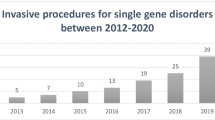Abstract
A follow up study of 168 Arab counselees that received premarital genetic counseling between 2001 and 2009, mostly since they planned to marry with a relative, was performed in 2013. Among the 156 cases in which the counselee married, 30 changed their marital plans (19.2 %). Those who changed their marital plans were more often Muslim Arabs that came for counseling since they were related in particular first cousins. Among the 126 counselee that married as planned, 66 were interviewed. From these interviews, it appears that many of the counselees that were related as first cousins or closer came to premarital genetic counseling in order to decide whether to marry. Most of the couples interviewed followed the recommendations concerning the use of folic acid and genetic tests. Among the 53 consanguineous couples interviewed, 49 women had 118 children. Among these 118 children, 8 (6.8 %) were born with a severe disease in 8 different families. This rate of malformations/genetic diseases is similar to the one observed for consanguineous couples from the general Arab population in the region, suggesting therefore that the premarital counseling and the adherence to the recommendations did not change the final risk to the counselees.
Similar content being viewed by others
References
Ahmadnezhad E, Sepehrvand N, Jahani FF, Hatami S, Kargar C, Mirmohammadkhani M, Bazargan-Hejazi S (2012) Evaluation and cost analysis of national health policy of thalassaemia screening in West-Azerbaijan province of Iran. Int J Prev Med 3:687–692
Al-Allawi NA, Jalal SD, Ahmed NH, Faraj AH, Shalli A, Hamamy H (2013) The first five years of a preventive programme for haemoglobinopathies in Northeastern Iraq. J Med Screen 20:171–176
Alswaidi FM, Memish ZA, O'Brien SJ, Al-Hamdan NA, Al-Enzy FM, Alhayani OA, Al-Wadey AM (2012) At-risk marriages after compulsory premarital testing and counseling for β-thalassemia and sickle cell disease in Saudi Arabia, 2005–2006. J Genet Couns 21:243–255
Bittles A (2012) Consanguinity in context (Cambridge studies in biological and evolutionary anthropology). Cambridge University Press, Cambridge UK
Hamamy H (2012) Consanguineous marriages: preconception consultation in primary health care settings. J Community Genet 3:185–192
Israeli Center for Disease Control (2011) Utilization of genetic tests and ultrasound for prenatal diagnosis by pregnant women in Israel (in Hebrew). Publication number 343: http://www.health.gov.il/publicationsfiles/gen25012012.pdf
Raz A (2005) The gene and the genie: tradition, medicalization, and genetic counseling in a Bedouin community in Israel, Carolina Academic Press
Shiloh S, Reznik H, Bat-Miriam-Katznelson M, Goldman B (1995) Pre-marital genetic counselling to consanguineous couples: attitudes, beliefs and decisions among counselled, noncounselled and unrelated couples in Israel. Soc Sci Med 41:1301–1310
Strulov A (2005) The Western Galilee experience: reducing infant mortality in the Arab population. Isr Med Assoc J 7:483–486
Teeuw ME, Henneman L, Bochdanovits Z, Heutink P, Kuik DJ, Cornel MC, Ten Kate LP (2010) Do consanguineous parents of a child affected by an autosomal recessive disease have more DNA identical-by-descent than similarly-related parents with healthy offspring? Design of a case-control study. BMC Med Genet 11:113
Vardi-Saliternik R, Friedlander Y, Cohen T (2002) Consanguinity in a population sample of Israeli Muslim Arabs, Christian Arabs and Druze. Ann Hum Biol 29:422–431
Zlotogora J, Barges S, Bisharat B, Shalev SA (2006) Genetic disorders among Palestinian Arabs. 4: genetic clinics in the community. Am J Med Genet A 140:1644–1646
Zlotogora J, Shalev SA (2010) The consequences of consanguinity on the rates of malformations and major medical conditions at birth and in early childhood in inbred populations. Am J Med Genet A 152A:2023–2028
Zlotogora J, Shalev SA (2014) Marriage patterns and reproductive decision-making by the inhabitants of a single Muslim village in a 50 year period. Human Heredity in press
Acknowledgments
The authors would like to thank Ms. Riham Abu-Saleh and Mrs. Orna Barak for their assistance with interviewing, and Mrs. Chen Gafni for coordinating this project. Also, we would like to thank the counselees involved in this study and their referring physicians of Clalit health fund, Israel. The experiments performed in the study comply with the current laws of Israel.
Author information
Authors and Affiliations
Corresponding author
Rights and permissions
About this article
Cite this article
Zlotogora, J., Shalev, S.A. A long-term follow up of premarital counseling in the Israeli Arab population. J Community Genet 5, 377–381 (2014). https://doi.org/10.1007/s12687-014-0192-2
Received:
Accepted:
Published:
Issue Date:
DOI: https://doi.org/10.1007/s12687-014-0192-2




